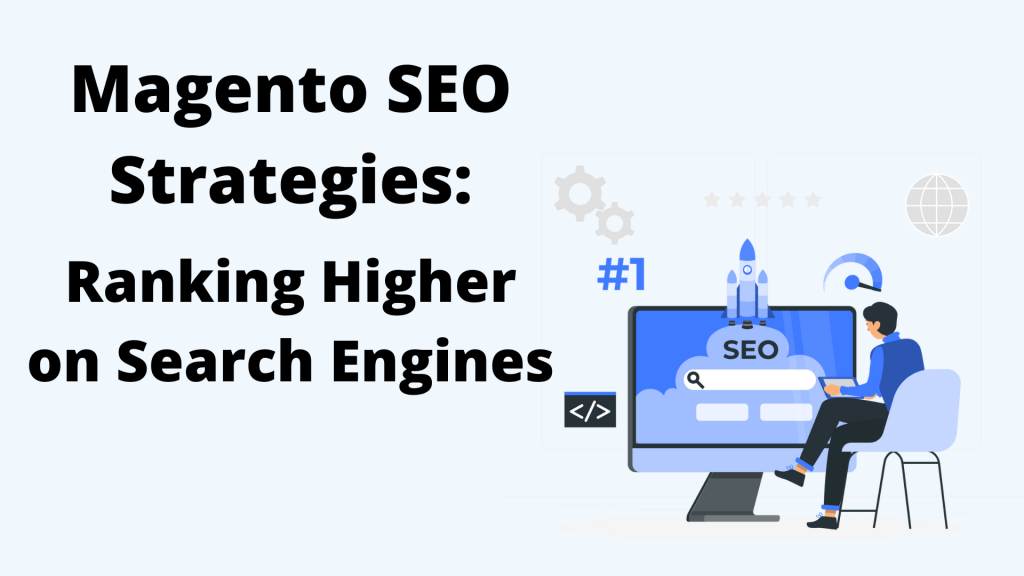
Magento SEO refers to the strategies and techniques used to optimize a Magento website for search engines. As one of the most popular ecommerce platforms, Magento offers a range of features and functionalities that can help improve a website's visibility in search engine rankings and attract potential customers. By utilizing various SEO strategies such as optimizing relevant keywords, meta descriptions, and XML sitemaps, as well as addressing duplicate content issues and improving user experience, Magento website owners can increase their chances of ranking higher on search engines and ultimately drive more organic traffic to their online stores. With its comprehensive admin panel and various SEO extensions available, Magento provides a robust platform for implementing and managing effective SEO practices.
Why is SEO Important for Magento Stores?
SEO, or Search Engine Optimization, is crucial for Magento stores to ensure maximum visibility, organic traffic, sales, brand authority, and user experience. When implemented effectively, Magento SEO strategies can help stores rank higher in search engine results pages (SERPs), driving targeted traffic to their website.
Ranking well in SERPs is vital as the majority of online experiences start with a search engine. Customers are more likely to click on the top results and often, the first page SERP captures more than 90% of search traffic. By optimizing Magento stores for search engines, businesses can tap into this immense potential and increase their visibility to potential customers.
Magento SEO best practices encompass a range of techniques including optimizing meta descriptions, using relevant keywords in content, creating XML sitemaps, implementing canonical links, and addressing duplicate content issues. These strategies enhance the search engine crawlers' understanding of the website's content, making it easier to index and rank.
A well-executed Magento SEO strategy also improves the user experience by optimizing title tags, internal links, and site speed. Additionally, it boosts brand authority as search engines perceive websites that follow SEO best practices as reliable and trustworthy.
In summary, SEO is essential for Magento stores as it increases visibility, drives organic traffic, improves sales, establishes brand authority, and enhances the user experience. Following Magento SEO best practices can play a significant role in achieving higher rankings in search engine results pages and ensuring the success of an online store.
Keyword Research & Targeting
Keyword research and targeting are crucial components of any Magento SEO strategy. By understanding the search terms and phrases that potential customers use, businesses can optimize their website's content to target and rank for these keywords. This involves conducting research to identify relevant and high-volume keywords that align with the business's products or services. Once these keywords are identified, they can be strategically incorporated into content, meta titles, tags for products, and other areas of the website. Targeting the right keywords enhances the website's visibility in search engine results pages (SERPs), increases organic traffic, and attracts highly relevant potential customers. It’s also important to regularly monitor and analyze keyword performance to identify new opportunities and make adjustments to the SEO strategy as needed. By focusing on effective keyword research and targeting, businesses can significantly improve their search engine rankings and drive more qualified traffic to their Magento stores.

Identifying Relevant Keywords
When it comes to optimizing your Magento website for search engines, identifying relevant keywords is crucial. These are the phrases and terms that potential customers are likely to use when searching for products or services you offer. However, it's not just about finding any keywords - it's about prioritizing those with strong commercial intent.
Commercial intent refers to the likelihood of someone making a purchase or taking a desired action after searching for a specific keyword. By focusing on keywords with strong commercial intent, you can attract highly motivated potential customers who are more likely to convert.
To identify relevant keywords and prioritize those with strong commercial intent, you can use tools like Google Keyword Planner, SEMRush, and Ahrefs. These tools allow you to explore different keyword ideas, analyze search volume and competition, and even uncover keywords that your competitors are targeting.
By researching and analyzing keywords, you can optimize your Magento website for the right phrases and improve your chances of ranking higher on search engine results pages. This can lead to increased visibility, higher conversion rates, and ultimately, more revenue for your business. So, don't underestimate the power of proper keyword research in your SEO strategy.
Understanding Potential Customers
Understanding Potential Customers is crucial for the success of any business. It involves identifying and catering to the needs and preferences of your target audience. In the realm of SEO, understanding potential customers is paramount in driving organic rankings and generating revenue.
One important aspect of understanding potential customers is user validation. Potential customers often seek validation before making a purchase, and customer reviews play a significant role in this process. Positive customer reviews not only impact organic rankings but also significantly influence purchase decisions, making them an essential aspect of SEO strategy.
SEO, in general, is a powerful tool for generating valuable, unpaid traffic from organic search results. By optimizing your website with relevant keywords, meta descriptions, and title tags, you increase your visibility in search engine results pages and attract potential customers who are actively searching for the products or services you offer.
Moreover, SEO also helps in increasing brand awareness. When your website ranks high in search engine results, it creates credibility and trust among potential customers, elevating your brand's visibility. Additionally, SEO efforts play a vital role in driving inbound marketing efforts by attracting qualified leads who are already interested in what you have to offer.
In conclusion, understanding potential customers is vital for SEO success. Anchoring your SEO strategy around customer validation and incorporating customer reviews can positively impact organic rankings, revenue, brand awareness, and inbound marketing efforts.
Determining Your Target Keywords
Determining your target keywords is a crucial step in your Magento SEO strategy. These keywords are the foundation of your website's optimization and play a significant role in attracting potential customers.
To begin, it is important to prioritize keywords with strong commercial intent. These are the keywords that have a higher likelihood of resulting in product sales. By focusing on keywords that are more likely to convert visitors into customers, you can optimize your efforts for maximum ROI.
Conducting thorough keyword research is essential. Tools like Google Keyword Planner, SEMRush, and Ahrefs can help identify relevant keywords and analyze competitor activity. These tools provide insights into search volumes, competition levels, and keyword trends, giving you a better understanding of what keywords to target.
When conducting keyword research, consider the specific products or services you offer, as well as your target audience. Think about the words and phrases they are likely to use when searching, and incorporate these keywords into your website's content.
Competitor analysis is another valuable aspect of determining your target keywords. By analyzing your competitors' SEO strategies, you can identify the keywords they are targeting and find opportunities to differentiate yourself. Look at the keywords they rank for, the content they create, and the strategies they employ to gain insight into how you can improve your own SEO efforts.
In summary, determining your target keywords requires careful consideration of commercial intent, thorough keyword research, and competitor analysis. By prioritizing keywords with strong commercial potential and using the right tools to analyze and research, you can optimize your Magento store for maximum visibility and increase the chances of attracting potential customers who are ready to make a purchase.
Analyzing Search Volume and Competition Level of Targeted Keywords
Analyzing the search volume and competition level of targeted keywords is a crucial step in Magento SEO strategy. To determine the search volume, it is important to utilize tools like Ahrefs and Google Keyword Planner. These tools provide insights into the number of searches conducted for specific keywords, helping you prioritize your efforts based on search volume.
Additionally, understanding the competition level of keywords is vital for successful SEO. High competition can make it challenging to rank higher in search engine rankings. Tools like Ahrefs and Google Keyword Planner can also help analyze the competition level of keywords by providing data on the number of websites targeting those keywords.
When prioritizing targeted keywords, it is advisable to focus on bottom-of-the-funnel keywords. These keywords have strong commercial intent and are more likely to result in actual product sales. By targeting keywords with higher conversion potential, you can optimize your SEO efforts for maximum ROI.
In summary, to analyze search volume and competition level, use tools like Ahrefs and Google Keyword Planner. Prioritize bottom-of-the-funnel keywords with strong commercial intent to increase the likelihood of product sales.

On-Page Optimization & Content Creation
On-Page Optimization is a crucial part of any SEO strategy, and for Magento websites, it plays a significant role in improving search engine rankings. This includes optimizing various elements of the webpage to make it more search engine-friendly and userfriendly. One important aspect of on-page optimization is keyword optimization. By incorporating relevant keywords in the title tags, meta descriptions, headers, and throughout the content, you can improve your website's visibility in search engines. Additionally, optimizing the URL structure, using internal links, and ensuring fast loading times can enhance user experience and improve SEO performance.
Content creation is also an essential component of Magento SEO. By creating highquality, unique, and relevant content, you can attract potential customers and improve your website's search engine visibility. This includes writing informative product descriptions, engaging blog posts, and informative category pages. Incorporating target keywords naturally in the content can help search engine crawlers understand the relevance of your website to specific search queries. It is also crucial to optimize images by using alt tags and reducing file size to improve page load speed. Furthermore, encouraging customer reviews and testimonials on your products can add credibility and provide unique and fresh content for search engines to index.
By focusing on on-page optimization and creating valuable content, you can improve your Magento website's visibility in search engines, attract potential customers, and ultimately boost your conversion rate.
Optimizing Title Tags and Meta Description
Optimizing title tags and meta descriptions is crucial for improving Magento SEO and increasing your website's visibility on search engines. A well-optimized title tag and meta description can attract potential customers by providing a concise and compelling snapshot of your webpage's content.
When optimizing title tags, it's important to include your primary keyword and make them descriptive, highlighting customer pain points. By addressing the specific needs and concerns of your target audience, you can increase the chances of attracting relevant traffic to your website.
To ensure that your title tags don't get truncated on search engine result pages, it's recommended to keep them under 50-60 characters. Additionally, placing your main keywords near the beginning of the title tag can improve search engine visibility and relevance.
For product titles and meta descriptions, it's important to maintain a balance between being concise and providing enough information. Product titles should be between 30-60 characters, while meta descriptions should be between 70-155 characters. Including relevant keywords in both the product title and meta description can improve their visibility on search engine result pages.
In conclusion, optimizing title tags and meta descriptions with relevant keywords and addressing customer pain points can significantly improve your Magento SEO. By following these guidelines, you can enhance your website's visibility and attract potential customers who are actively searching for products or services you offer.
Writing SEO-Friendly Product Descriptions
When it comes to Magento stores, writing SEO-friendly product descriptions is crucial for improving search engine visibility and attracting potential customers. Here are some tips to create effective content:
- Write detailed descriptions: Provide comprehensive information about your products, including features, benefits, and specifications. Detailed descriptions not only help potential customers make informed decisions but also provide search engines with valuable content to index.
- Use heading tags: Utilize heading tags (H1, H2, etc.) to structure your product descriptions. This not only helps search engine crawlers understand the hierarchy of your content but also makes it easier for users to skim through the information.
- Incorporate primary and secondary keywords: Include relevant keywords naturally throughout your product descriptions. Place your primary keyword in the beginning and strategically sprinkle secondary keywords throughout the text. This helps search engines understand the context of your content and improves its relevance
- Avoid keyword stuffing: While keywords are important, avoid stuffing them excessively in your descriptions. This not only leads to poor user experience but can also harm your search engine rankings. Focus on providing valuable information rather than overusing keywords.
- Include links to related products: Boost your internal linking strategy by incorporating links to related products within your descriptions. This improves user experience, encourages exploration, and signals search engines that your content is interconnected.
- Customize the robots.txt file: Make sure search engine robots can crawl and index your product descriptions by customizing your website's robots.txt file. This file controls which pages search engines can access and can be modified to prioritize the visibility of your product descriptions.
By following these tips, you can create SEO-friendly product descriptions that enhance your Magento store's visibility, attract potential customers, and improve your search engine rankings.
Enhancing Product Images for SEO Purposes
Enhancing product images is crucial for improving SEO performance. Search engines not only crawl and index text-based content but also analyze images on webpages. Here's why optimizing product images is important for SEO purposes:
Firstly, optimizing the file name and alt text of the images with relevant keywords helps search engines understand and recommend your products. Including descriptive keywords in the file name and alt text provides context and improves the visibility of your products in search engine results.
Secondly, resizing and compressing the images can significantly improve website loading speed. Fast-loading websites have better user experience and are favored by search engines. Resizing the images to fit the webpage dimensions and compressing them without sacrificing quality reduces file size and enhances website performance.
By enhancing product images, you not only improve the visual appeal of your website but also make it easier for search engines to understand and recommend your products. Incorporating relevant keywords in the file name and alt text, and optimizing image sizes contribute to better SEO performance and increase the visibility of your products online.
Utilizing Category URLs to Your Advantage
Utilizing category URLs is crucial for improving your Magento SEO and enhancing the user experience. By making your category URLs more user-friendly and SEO-friendly, you can boost your website's visibility on search engines and make it easier for potential customers to navigate through your products.
To optimize category page URLs, start by accessing the Catalog > Categories settings in your Magento admin panel. Here, you can set a descriptive and keyword-rich URL for each category. It's important to carefully choose relevant keywords that accurately represent the content of the category page.
Well-structured and SEO-friendly URLs are key to enhancing your website's search engine visibility. Make sure to include descriptive keywords that align with your target audience's search queries. Keeping URLs short and simple is also important, as excessively long and convoluted URLs can be confusing to both users and search engine crawlers.
Furthermore, avoid using special characters and numbers in your URLs, as they can make them less readable and less user-friendly. Instead, focus on using clear, concise, and relevant keywords that accurately describe the category's content.
By optimizing your category page URLs, you can improve your website's visibility in search engine rankings and provide a smoother user experience, ultimately driving more traffic to your online store.

Crafting Unique and Quality Content for Your Blogs & Articles
Crafting unique and quality content for your blogs and articles is of utmost importance when it comes to Magento SEO. Not only does unique content contribute to the overall user experience, but it also plays a significant role in improving search engine rankings.
Regularly publishing high-quality, keyword-optimized blog posts can bring numerous benefits to your Magento site. Firstly, it allows you to target a wider range of keywords, increasing your chances of ranking higher in search engine results. This, in turn, drives more organic traffic to your website and increases visibility among potential customers.
Moreover, consistently publishing valuable content helps establish your brand as an industry authority. When you provide insightful, well-researched articles that address the needs and questions of your target audience, you build trust and credibility. This positions your brand as a reliable source of information within your niche.
To create valuable content, start by understanding your audience. Conduct thorough research to identify their pain points, interests, and preferences. Then, incorporate relevant keywords into your writing to improve search engine visibility. Craft compelling, well-structured articles that provide clear and concise answers to your audience's questions.
Remember, the key to successful content creation lies in producing unique and quality content that offers value to your readers. By focusing on these aspects, you can enhance your Magento SEO strategy and drive consistent traffic to your website.
Creating XML Sitemaps and Canonical Links
Creating XML sitemaps and implementing canonical links in Magento 2 are crucial strategies for improving search engine indexing and ranking.
XML sitemaps act as a road map for search engine crawlers, helping them navigate and understand the structure of your website. By creating an XML sitemap in Magento 2, you ensure that all your important pages are discovered and indexed by search engines. This enhances your website's visibility, making it easier for potential customers to find you.
To configure XML sitemap settings in Magento 2, navigate to Stores > Configuration > Catalog > XML Sitemap. From here, you can customize various settings such as the frequency of sitemap generation, priority for different page types, and whether to include or exclude certain pages.
On the other hand, canonical links are essential for preventing duplicate content issues and consolidating ranking signals. By specifying a canonical link for a page, you tell search engines which version of the page should be considered the primary source. This helps avoid confusion and ensures that the correct page is indexed and ranked. Magento 2 provides built-in support for adding canonical links to each page, making it easy to implement this strategy.
Overall, creating XML sitemaps and implementing canonical links in Magento 2 play a vital role in improving search engine indexing, ranking, and preventing duplicate content issues. By utilizing these strategies, you can enhance your website's visibility and drive more organic traffic to your Magento 2 site.
Technical Aspects of SEO for Magento Stores
When it comes to optimizing SEO for Magento stores, there are several technical aspects that need to be taken into consideration. One important aspect is URL rewrites, which allow you to create keyword-rich and user-friendly URLs for your Magento store's pages.
By optimizing your URLs, you can improve your website's visibility to search engines and potential customers.
Another aspect to consider is the use of SEO extensions. These extensions provide additional functionality and features specifically designed to enhance your store's SEO performance. They can help with tasks such as generating XML sitemaps, managing meta tags, optimizing product URLs, and improving search engine visibility.
Creating an SEO checklist is also crucial for ensuring that you cover all the necessary SEO elements for your Magento store. This checklist should include tasks such as optimizing meta titles and descriptions, utilizing relevant keywords, implementing canonical tags, and setting up proper redirects.
To improve site speed, optimizing CSS files is essential. Minifying and compressing your CSS files can help reduce their file size, resulting in faster load times for your store's web pages. This, in turn, can lead to better user experience and improved SEO rankings.
Lastly, fixing broken links is important for maintaining a healthy website structure and user experience. Broken links can negatively impact your SEO efforts and cause frustration for visitors. Regularly auditing your store's links and addressing any broken ones can help improve your website's overall performance.
By considering these technical aspects and implementing the necessary optimizations, you can improve the SEO performance of your Magento store and increase its visibility to search engines and potential customers.
 Magento SEO refers to the strategies and techniques used to optimize a Magento website for search engines. As one of the most popular ecommerce platforms, Magento offers a range of features and functionalities that can help improve a website's visibility in search engine rankings and attract potential customers. By utilizing various SEO strategies such as optimizing relevant keywords, meta descriptions, and XML sitemaps, as well as addressing duplicate content issues and improving user experience, Magento website owners can increase their chances of ranking higher on search engines and ultimately drive more organic traffic to their online stores. With its comprehensive admin panel and various SEO extensions available, Magento provides a robust platform for implementing and managing effective SEO practices.
Magento SEO refers to the strategies and techniques used to optimize a Magento website for search engines. As one of the most popular ecommerce platforms, Magento offers a range of features and functionalities that can help improve a website's visibility in search engine rankings and attract potential customers. By utilizing various SEO strategies such as optimizing relevant keywords, meta descriptions, and XML sitemaps, as well as addressing duplicate content issues and improving user experience, Magento website owners can increase their chances of ranking higher on search engines and ultimately drive more organic traffic to their online stores. With its comprehensive admin panel and various SEO extensions available, Magento provides a robust platform for implementing and managing effective SEO practices.





